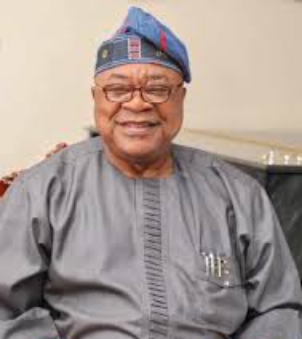Alao-Akala Family Feud Deepens as Daughter Seeks DNA Test, Exhumation of Late Governor

A fresh legal storm is brewing within the family of the late former Governor of Oyo State, Otunba Christopher Adebayo Alao-Akala, as his first daughter, Mrs. Oluwatoyin Alao-Aderinto, has approached an Oyo State High Court seeking a court-ordered DNA test on seven individuals claiming to be the biological children of the late politician.

Mrs. Alao-Aderinto is also seeking an order to exhume the remains of the former governor—interred at a mausoleum within his Ogbomoso country home—for the purpose of conducting the paternity tests.


The motion, filed before Justice Taiwo of Court 12, High Court Ring Road, Ibadan, with suit number I/443/2024, was brought through her legal representative, Senior Advocate of Nigeria, Oladipo Olasope. It marks a significant escalation in a family dispute that has simmered since Alao-Akala’s passing in January 2022.
According to court filings, Mrs. Alao-Aderinto is requesting that DNA tests be conducted on herself and seven other individuals: Olamide, Adebukola, Olamipo, Olamiju (a sitting member of the House of Representatives), Tabitha, and Olamikunle. The aim, she stated, is to conclusively determine their biological relationship with the late governor.

She has further prayed the court to allow the test be conducted at a certified and court-approved laboratory, with the results submitted under seal directly to the presiding judge for pronouncement in open court.
The move comes amid mounting controversy over the control and distribution of Alao-Akala’s extensive estate, which includes numerous properties and financial assets in Nigeria, the United Kingdom, the United States, and Ghana. The estate is believed to encompass luxury homes, a five-star hotel, high-end vehicles, and multiple bank accounts with balances in naira, dollars, and pounds sterling.
At the heart of the feud is a 2022 Letter of Administration obtained from the Oyo State Probate Registry by Kemi Alao-Akala and Olamide Alabi—believed to be one of the late governor’s daughters—without the knowledge or consent of Oluwatoyin, the late governor’s first child. The action, according to her, was a deliberate and unlawful attempt to sideline her from the estate’s administration, contrary to the laws guiding intestate succession in Nigeria.
In her affidavit, Oluwatoyin accuses the two administrators of manipulating legal processes to assert exclusive control over the estate, a move she says not only marginalizes other possible beneficiaries but also casts doubt on the true identities of the recognized heirs.
Her counsel, Oladipo Olasope SAN, insists that the court must intervene to bring clarity and fairness to the situation. “This is not a contest of privilege, but a call for equity. If any person is wrongly included or excluded as a biological child, only scientific proof can correct the error,” he stated.
The legal action is the latest development in what has become a deeply divisive battle within the Alao-Akala household, with potential implications for the family’s public image and the enduring legacy of the former governor.
Observers say the court’s eventual ruling could set a precedent for estate disputes involving prominent political families in Nigeria, particularly where questions of paternity and rightful inheritance remain unresolved.
Justice Taiwo is expected to rule on the application in the coming weeks.

